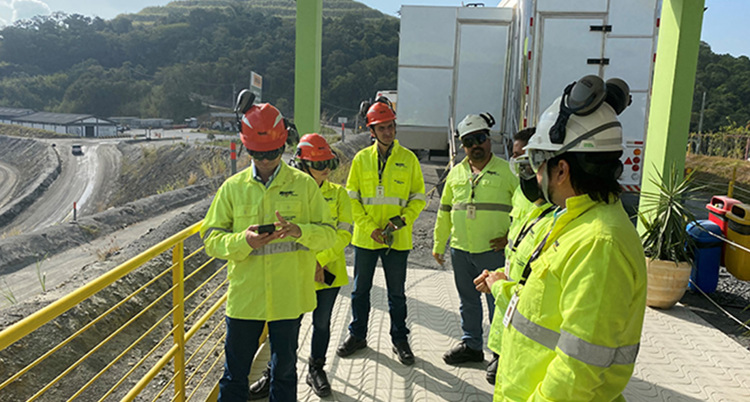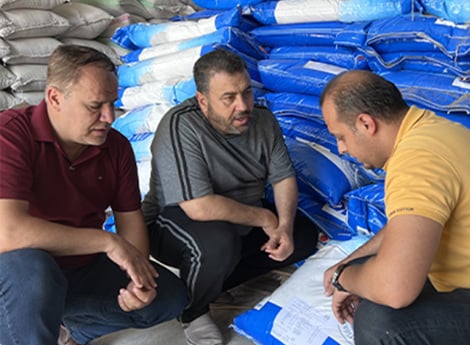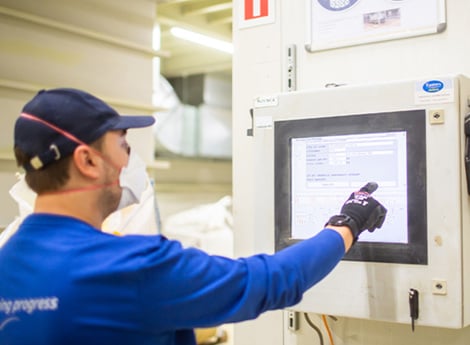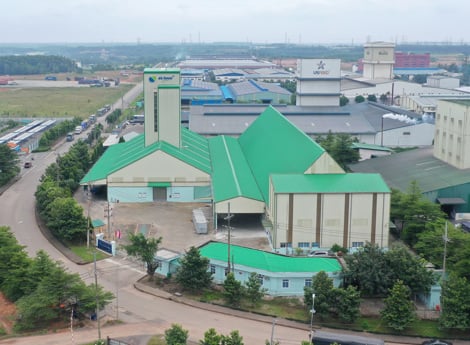Good milling starts with high-quality ingredients
High-quality ingredients are by no means guaranteed. To ensure the best possible ingredients and guarantee consistent supply, it’s essential to carefully select suppliers and work with them in the right way on an ongoing basis. We interviewed Carl IJzerman, Group Manager QA/QC, and Mark Viejou, Global Purchaser Minerals and Trace Elements, to find out how De Heus collaborates with suppliers so that everybody wins.

How does De Heus ensure that suppliers provide high-quality ingredients for premix animal feed?
Mark: “Global purchasing takes the lead in supplier relationships. When selecting suppliers, we look at a combination of factors, but first and foremost is consistent quality. To deliver predictable results, we need high-quality ingredients. We aim to have suppliers who can offer their products to our business units all over the world, not just in one country. This makes product standardisation easier so we can guarantee consistent quality. Good service, competitive prices and the ability to deliver when and where we want are also important. What’s more, a long-term focus is crucial. De Heus values its suppliers and we’re looking for a supplier base that can support our future growth.”
Carl: “Quality Assurance (QA) plays an important role in ensuring that ingredients are of a consistent high quality, especially with premix animal feed ingredients which are included at low inclusion rates for the production of a relatively large amount of animal feed. Formulating a premix is a very precise job which sometimes involves blending numerous micro-ingredients accurately. This has implications for the quality of these ingredients, which need to be consistent and reliable. The first step in approving a supplier is to apply our vendor quality management system which uses a structured decision-making process. We evaluate specifications, documentation and safety processes. In addition, the behaviour of ingredients in formulation, production and premix animal feed has to be taken into account. We also conduct an assessment of the supplier’s raw material in which we evaluate product risk.”
“A long-term focus is crucial. De Heus values its suppliers and we’re looking for a supplier base that can support our future growth.”
How do you monitor suppliers over time to ensure consistent quality?
Carl: “Once a supplier is on board, we recommend an appropriate audit schedule based on ingredient properties and any potential issues. Together with Global Formulations, Global QA sets worldwide standards related to nutritional value and undesirable substances amongst many other parameters. Then it’s up to the QA managers at our business units to implement these standards as a minimum along with any standards based on local legislation and customer requirements. Local QA has a lot of independence. Global QA provides support with standards and tools, but local QA makes the final decision in collaboration with local management. It’s not a top-down process. That’s what’s unique about De Heus.”
How do you encourage suppliers to deliver the best possible quality?
Carl: “We roll out global and local standards and then regularly measure and test to reduce any deviations. If a business unit is not fully satisfied with the quality of a certain ingredient, the supplier is informed, so they can take corrective action. Global QA continually challenges the business units to stay on top of the market so we can be better than our competitors. That’s what we mean by powering progress.”
“We’re currently developing a supplier performance dashboard which will form the basis for discussions with suppliers. How can they improve? How can we develop our relationship with good suppliers, through larger volumes for example? If a supplier improves, we don’t have to audit them as often, there’s less rework and it reduces risks for both De Heus and our customers.”
Mark: “There’s a lot Global Purchasing does in relation to supplier management. We are willing to invest our time in providing feedback, sharing our expertise and working with suppliers to improve the quality of our products together. To foster strategic partnerships, we encourage suppliers to improve on all criteria: price, quality, service and delivery. But of course, some suppliers are better on particular criteria than others. That’s why we have several suppliers for each ingredient so we’re not dependent on one source. It guarantees security of supply for our customers.”
Shared farm knowledge & tailored premix compositions for the best performance
Discover how you can benefit from our Premix approachDiscover how you can benefit from our premix approach?
We add value to your production process and offer professional advice regarding the feeding management of your animals.

Rutger Oudejans
Group Director Premixes, Specialties and Concentrates
Are there any specific examples of improvements that have been made?
Mark: “Recently, our premix animal feed factory in Veghel, the Netherlands, had problems with a supply of Copper Sulphate. The product was in line with specifications and documentation, but it was lumpy and therefore wasn’t flowing properly in production. We contacted the supplier who suggested increasing the amount of anti-caking agent. Local QA approved the change and the information was added to the supplier data. This corrective action will be monitored over time.”
“In another example, a phosphate supplier in Spain was providing a product with a standard particle size. But several local business units noticed that some particles were too fine resulting in a dusty ingredient. This was a problem, so the local QA manager conducted an audit and recommended that the supplier implement another screening step to filter out the dust. Suppliers tend to appreciate this type of feedback. De Heus represents the market so we hold up a mirror. It almost like free consultancy. What’s more, if we do an audit it’s a sign that you’re a valued supplier.”
How does this close working relationship with suppliers benefit both De Heus customers and the suppliers themselves?
Mark: “De Heus has grown enormously in recent years and our potential for future growth is unique. In that sense, we’re an interesting customer for suppliers since they can benefit from our growth and expand with us.”
Carl: “Your output is only as good as your input, so when you have high quality in, you’ve made the first step to high quality out. If we execute our QA programme correctly, customers get premix animal feed of a consistent high quality for their production with no hassle and great peace of mind.”
Premix Talks
This magazines provides a great overview of the efforts to design and produce premixes that deliver great-quality animal feed for healthy and productive animals. Enjoy reading









